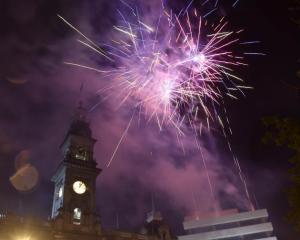Three hundred Auschwitz survivors - most now in their 90s - returned to the former Nazi death camp, 70 years after it was liberated.
Between 1940-45, about 1.1 million people, including one million Jews were put to death or perished in the twin death camps of Auschwitz-Birkenau created by Nazi Germany in Oswiecim, southern Poland.
Liberated by the Soviet Red Army on January 27, 1945, the camps have become an enduring monument to the atrocities of war.
The Soviet soldiers were mounted on shaggy ponies, their submachine guns slung across their backs.
In front of them stood Auschwitz-Birkenau.
Officers gazed around in disbelief before calling medical teams to care for the thousands of prisoners left behind.
Unfortunately, the organisers of the events marking the 70th anniversary of the liberation are concerned the world's attention will not be focused entirely on the victims and survivors.
As leaders and delegations around the world attend the ceremony, media coverage will be intense, especially after the murder of four Jews at a kosher grocery in Paris.
But another European crisis is intruding - the Ukraine.
Russian President Vladimir Putin is staying away from the event, despite delivering a speech at Auschwitz at a similar event a decade ago.
Overseas, this is seen as highlighting the damage his Ukraine policies have done to Russia's relations with Europe and presages what is likely to be a series of diplomatic snubs and boycotts in the months ahead as Europe commemorates the 70th anniversary of the defeat of Hitler's Germany.
The Polish foreign ministry confirmed it had not invited Mr Putin but added Moscow was welcome to send whomever it wished.
A Putin trip to Poland would have been intensely awkward for Warsaw, which has been leading a hawkish line on Russia in the European Union over the conflict in Ukraine.
The Russians are proud of their role in defeating the Nazis in what they call the great patriotic war.
Victory Day, on May 9, is a national holiday celebrated with pomp and circumstance on the capital's Red Square.
Already two Baltic states, Estonia and Lithuania, fearful and critical of Russian actions in Ukraine, have said they will stay away from the May 9 events.
The third Baltic state, Latvia - which has just inherited the rotating EU presidency - is trying to fashion a common European position on the Moscow ceremonies.
The resurgence of nationalism in Russia under Mr Putin, and his territorial designs on Ukraine, have reignited hostility and fear across eastern Europe and sparked panic in western Europe and Nato.
The Baltic states struggle to share the sentiment regarding May 9 being Russia's finest hour as it coincided with their forcible incorporation into Stalin's Soviet Union, while the Poles and the rest of eastern Europe were hauled into the Soviet bloc for the following 40 years.
Author Antony Beevor writes it is a pity Mr Putin was not invited as his absence is a reminder this particular chapter in Russia's World War 2 war history, was, and remains, full of contradictions.
He writes Stalin focused his attention on the death of Polish Catholics, hoping the Poles might focus any anger at their bitter fate entirely against Germany and not the Soviet Union which brutally occupied Poland from 1944.
Stalin was the first Holocaust denier.
The boundaries of European countries have been torn apart for centuries, often put together at the behest of a strong dictator, rather than on an ethnic or an extended familial basis.
In the Ukraine, this continues to be played out with savagery.
Crimea being annexed into Russia was a warning to the West of Mr Putin's intentions and nothing has changed.
However, what must never be forgotten is the pain and suffering millions of families went through in the concentration camps.
The fact 100 Jewish survivors of concentration camps from Israel are at Auschwitz to remember is a testament to the strength of humanity.
Someone needed to survive so the story could be told.
This story, which will soon move from first-hand accounts to history books as the survivor numbers continue to dwindle, must never be removed from our minds.











